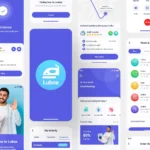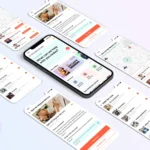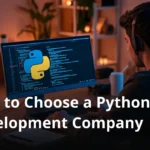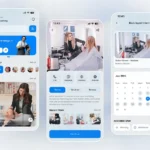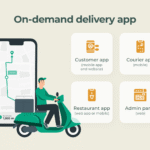At ReadAuthentic, every insight begins with verified research and real-world validation. Modern startups no longer wait for a full product to test their ideas. They start lean, launch fast, and validate real user demand through a Minimum Viable Product (MVP). MVP development empowers founders to minimize risk, attract investors, and focus resources on features that truly matter.
According to a report by CB Insights, 42 percent of startups fail because they build products without proven market demand. MVP development companies solve this problem by helping startups release functional prototypes quickly, gather real-world feedback, and pivot faster.
This article by ReadAuthentic Research compiles verified insights on the top MVP development companies in 2025, featuring firms known for innovation, reliability, and startup-centric execution. Each has been evaluated for technical expertise, delivery speed, and success across industries such as fintech, healthtech, and SaaS.
Why MVP Development Matters for Startups
For modern founders, building an MVP is not just a cost-saving tactic. It is a strategic validation model that allows startups to test assumptions, measure user response, and refine products before committing to large-scale investment.
Early Validation and Real Market Feedback
Startups succeed when they build what users actually need. A study by Startup Genome found that early validation through MVPs increases a startup’s survival rate by more than 30 percent. Launching an MVP helps teams avoid the “feature overload” trap and focus only on what drives user value.
Cost Efficiency and Faster Market Entry
An MVP enables founders to test ideas without draining budgets. According to Statista, startups that optimize early-stage development using lean or MVP methods save up to 50 percent in initial costs compared to full-scale builds. This lean approach shortens development cycles and brings products to market months earlier.
Learning Through Iteration
Every MVP acts as a learning engine. As explained by ProductPlan, iterative feedback helps teams pivot quickly, uncover new opportunities, and align product direction with real user behavior. Continuous iteration ensures that future updates are based on data rather than assumptions.
Building Investor Confidence
Investors prefer startups that prove traction early. A working MVP demonstrates real-world demand and execution capability, both of which are critical for attracting funding. Insights from TechCrunch show that founders who present functional MVPs during funding rounds are twice as likely to secure seed-stage capital.
In essence, MVP development is about clarity and confidence. It helps founders validate their ideas, conserve resources, and build trust with investors while creating products that the market actually wants.
Key Criteria for Evaluating MVP Development Companies
Choosing the right MVP development partner can determine whether a startup achieves market success or stalls before launch. Beyond technical expertise, founders must assess credibility, delivery approach, and post-launch support. These factors ensure a smooth path from concept to customer validation.
Proven Technical Expertise
An experienced MVP firm should have a strong command of modern frameworks and product architectures. According to Clutch, top-rated MVP development companies often specialize in agile methodologies and scalable cloud environments that support quick iterations. Reviewing case studies and verified client feedback helps founders assess whether a team can handle complex, multi-platform projects.
Domain Experience and Industry Fit
Startups benefit from partners who understand their market landscape. A company with prior experience in industries like fintech, SaaS, or healthtech can offer valuable strategic insights. GoodFirms notes that domain experience improves product-market fit and reduces onboarding time, resulting in faster execution and fewer development hurdles.
Product Strategy and Discovery Capability
A strong MVP partner contributes beyond coding. They help shape the product roadmap and refine the value proposition. According to ProductSchool, the discovery phase is critical for identifying the smallest viable feature set that delivers core value to users. Teams that emphasize research and design thinking often produce MVPs that convert faster and scale better.
Transparent Process and Agile Delivery
Clear communication and iterative delivery are key to successful MVP execution. Atlassian highlights that agile MVP development promotes adaptability through short sprints, continuous feedback, and real-time tracking. Founders should look for teams that offer transparent reporting, defined sprint goals, and early prototype visibility.
Post-Launch Support and Scalability
A reliable MVP development company ensures support beyond the initial launch. As noted by DesignRush, startups that continue collaboration with their MVP partner during scaling experience higher retention and fewer technical issues. Post-launch maintenance, analytics tracking, and performance optimization reflect a long-term partnership mindset rather than a project-based approach.
Selecting an MVP partner involves more than checking portfolios. It is about finding a team that understands validation, scalability, and startup urgency, and can evolve with your product journey.
Top MVP Development Companies & Detailed Profiles
Below we present our curated list of top MVP development companies. For each, you’ll find their overview, MVP-specific strengths, and key metrics that help you decide which partner best aligns with your startup’s goals.
1. ScienceSoft
About ScienceSoft
ScienceSoft is a global IT consulting and software development company founded in 1989 and headquartered in McKinney, Texas, USA. Over more than three decades, the company has grown to include over 750 IT professionals and delivered thousands of software projects across multiple industries.
In MVP development, ScienceSoft provides end-to-end services that include planning, prototyping, architecture design, development, testing, deployment, and post-launch optimization. The company focuses on building lean MVPs with essential features to validate market demand while ensuring scalability for future expansion.
Its team leverages modern technologies such as AI, cloud computing, blockchain, big data, AR/VR, and IoT to develop future-ready MVP solutions that combine innovation with practical business value.
|
Attribute |
Value / Details |
|
Clutch Rating |
4.8 overall rating from 39+ reviews |
|
Team Size |
750+ IT professionals |
|
Projects Delivered |
4,000+ projects across 30+ industries |
|
MVP Case Study Examples |
Collaboration Platform MVP and Healthcare MVP for VitalOp Wellness |
|
Industries Served |
Healthcare, BFSI, retail, logistics, manufacturing, telecom |
Why ScienceSoft Stands Out
- Strong balance between speed and technical depth in MVP development
- Expertise in emerging technologies for scalable and future-proof solutions
- End-to-end product lifecycle support from MVP to full-scale product
- 30+ years of proven experience delivering measurable client results
2. Syndicode
About Syndicode
Syndicode is a full-cycle custom software development firm founded around 2014. The company employs over 70 engineers, designers, architects, and IT managers distributed globally. They deliver B2B & B2C digital products, mobile and web applications, SaaS, marketplaces, and more.
In the MVP space, Syndicode emphasizes ideation, prototyping, lean development, and architecture that supports scaling. Their approach ensures early validation and a roadmap for growth even after the initial MVP is built.
They combine technical rigor with design thinking to deliver MVP solutions that are not just functional but elegant, extensible, and business-aligned.
|
Attribute |
Value / Details |
|
Clutch Rating |
Full profile on Clutch with client reviews (see Syndicode’s Clutch page) |
|
Team Size |
70+ engineers, designers, architects, and IT managers |
|
Projects Delivered |
End-to-end software solutions across 100+ businesses globally |
|
MVP Case Study Examples |
Syndicode often features MVP stories in its blog on lean roadmaps and early phase apps |
|
Industries Served |
SaaS, marketplaces, fintech, B2B & B2C platforms |
Why Syndicode Stands Out
- Strong emphasis on lean architecture from the start, so MVPs don’t need complete rewrites
- Balanced mix of design thinking + engineering discipline for usable and maintainable MVPs
- Rapid onboarding and flexible time-zone collaboration for startups globally
- Proven startup track record with clients in Europe and North America
- Focus on sustainable growth — MVPs built to evolve, not be discarded
3. Method
About Method
Method is a strategic design and digital product development consultancy founded in 1999 and now part of GlobalLogic. The firm operates globally with a presence across multiple countries, combining boutique design agility with enterprise-scale engineering support.
In MVP development, Method emphasizes product strategy, discovery, prototyping, and engineering alignment. They help clients validate digital ideas early while building architecture that can scale as the product grows. Their approach blends UX/UI design, technical planning, and iterative delivery to craft lean, high-impact MVPs.
They specialize in transforming complex business challenges into streamlined digital products using human-centered design principles and robust engineering practices.
|
Attribute |
Value / Details |
|
Clutch Rating |
(You can check Method’s Clutch profile for ratings) |
|
Team Size |
350+ employees and design & engineering teams globally |
|
Projects Delivered |
Numerous digital products across industries including finance, consumer, healthcare |
|
MVP Case Study Examples |
Method shares work with clients like Jenius Bank, McDonald’s, Full Swing (prototyping & product launches) |
|
Industries Served |
Financial services, healthcare, consumer, industrial, enterprise software |
Why Method Stands Out
- Combines design strategy + engineering discipline for MVPs that are both usable and technically solid
- Able to serve enterprise clients and startups thanks to backing from GlobalLogic
- Focus on early discovery and validation to reduce risk before full development
- Deep experience across multiple verticals ensures adaptability
4. JetRockets
About JetRockets
JetRockets is a boutique software development firm that specializes in helping startups transition from prototypes or no-code tools to full custom products. Their services include MVP builds, product discovery, UX/UI design, and scalable platform architecture.
When working on MVPs, JetRockets focuses on technical discovery, feature prioritization, clean Ruby on Rails backend development, and post-launch support. Their process helps founders take validated prototypes and turn them into robust digital products ready for growth.
They emphasize transparent collaboration with clients, lean architecture, and modular design to keep MVPs extensible for future scaling.
|
Attribute |
Value / Details |
|
Clutch Rating |
JetRockets has a presence on review platforms and is cited in top MVP lists (e.g. “Top MVP Development Companies 2025”) |
|
Team Size |
A small, expert team focused on lean delivery |
|
Projects Delivered |
Several MVP to platform migrations and early-stage digital product builds |
|
MVP Case Study Examples |
JetRockets offers “MVP to Platform” services showing how they evolve prototypes to full apps |
|
Industries Served |
Startups across fintech, health, consumer, and B2B verticals |
Why JetRockets Stands Out
- Expert in evolving prototype/no-code MVPs into full custom platforms
- Strong in discovery and architecture planning before full development
- Clear focus on Ruby on Rails and scalable backend systems
- Boutique size allows personalized attention and high responsiveness
- Their JR Ventures program offers support for non-technical founders building MVPs over longer term
5. Intellectsoft
About Intellectsoft
Intellectsoft is a digital transformation consultancy and engineering company founded in 2007. The firm serves global enterprises and startups, guiding them from ideation through delivery and ongoing support. Their offerings include custom software, mobile apps, UX/UI design, product engineering, and MVP development.
In their MVP work, Intellectsoft emphasizes agile methodologies, lean delivery, and iterative validation. They build core functional MVPs that enable early market feedback and shape scalable roadmaps. The company balances design, engineering, and strategic consulting to produce MVPs that align with business goals.
Their industry experience spans FinTech, healthcare, logistics, insurance, retail, and more, allowing them to craft domain-sensitive MVP solutions informed by sector insights.
|
Attribute |
Value / Details |
|
Clutch Rating |
40+ reviews, strong client reputation (see Clutch profile) |
|
Team Size |
50–249 employees (per Clutch) |
|
Projects Delivered |
Dozens of MVPs and full-cycle software solutions across global clients |
|
MVP Case Study Examples |
They showcase MVP / PoC service in their services pages and blog |
|
Industries Served |
FinTech, healthcare, logistics, insurance, retail, enterprise solutions |
Why Intellectsoft Stands Out
- Strong focus on digital transformation so MVPs are aligned to long-term enterprise roadmaps
- Proven experience with enterprise clients ensures high standards in design, security, and scalability
- Ability to blend consulting + engineering + design—helping clients through strategy and build phases
- Agile & iterative delivery approach that supports feedback loops and pivots
Why These Companies Were Selected by ReadAuthentic
Each company featured here was independently verified by ReadAuthentic for its proven success in MVP delivery, consistent client satisfaction, and ability to turn early-stage ideas into scalable products backed by real market validation.
Emerging MVP Development Trends in 2025
The MVP landscape in 2025 continues to evolve as technology, investor behavior, and market expectations change rapidly. Startups and product teams are now focusing on smarter, data-driven validation instead of just faster releases.
AI-Assisted Prototyping and Automation
Artificial intelligence is accelerating MVP design, testing, and iteration. According to Gartner, generative AI tools are helping teams reduce prototyping time by over 40 percent through automated wireframing and user flow modeling. AI-driven analytics also enable product managers to prioritize high-value features early in the MVP stage.
Rise of No-Code and Low-Code MVPs
The accessibility of no-code platforms is allowing founders to launch MVPs in weeks instead of months. A recent report by Statista projects the low-code market to exceed USD 65 billion by 2027, driven by startups testing new business models quickly without heavy engineering costs. These tools help validate user interest before scaling into custom builds.
Data-Driven Product Validation
Founders are now integrating analytics, session tracking, and heatmaps from day one. This shift toward data-first MVPs means teams learn what users actually do, not what they say. Mixpanel notes that MVPs equipped with built-in analytics see faster iteration cycles and 25 percent higher product adoption post-launch.
Cloud-Native and Scalable Architectures
Modern MVPs are no longer throwaway builds. With cloud-native development, products can grow without re-engineering. AWS Startups highlights that scalable infrastructure and microservices let founders evolve MVPs into full production platforms effortlessly while keeping operating costs predictable.
AI-Driven Market Research and Predictive Testing
Instead of relying solely on user interviews, startups are using AI to forecast market response. Tools powered by natural language processing analyze trends, audience sentiment, and competitor gaps to validate MVP concepts before development begins. This predictive approach helps startups allocate budgets more effectively and improve funding readiness.
How to Choose the Right MVP Partner for Your Startup
Selecting the right MVP development partner determines how effectively your idea moves from concept to market validation. Founders should look for more than technical expertise — strategic collaboration, discovery capability, and scalability are what truly define long-term success.
Evaluate Strategic Understanding, Not Just Coding Skills
An ideal MVP partner must understand your business vision and market positioning, not just your tech stack. Startups that work with strategic product partners achieve faster validation and fewer redesign cycles. Articles from TechTarget emphasize that product alignment and goal clarity are critical before development begins.
Review Proven MVP Case Studies and Client Feedback
Client testimonials and case studies are the best indicators of real-world performance. Verified platforms like Clutch allow founders to explore reviews, portfolios, and client satisfaction scores before partnering with a firm. Look for case studies that highlight funding achievements, active user growth, or measurable ROI after MVP launch.
Assess Design and Discovery Capability
A company that invests time in discovery and UX validation often builds stronger MVPs. As outlined by Maze, teams that follow structured user testing, wireframing, and prototype validation reduce post-launch redesign costs by up to 35 percent. Evaluate whether your partner conducts usability testing before coding begins.
Prioritize Transparency and Communication
Transparency throughout the MVP process ensures fewer surprises and stronger collaboration. Atlassian notes that agile product management encourages visibility through sprint demos, progress reports, and shared workflows. Founders should expect consistent updates and milestone-based reporting to maintain alignment.
Check for Post-MVP Support and Scalability Options
A reliable partner offers guidance even after your MVP goes live. According to Acquaint Softtech, post-launch optimization and feature iteration are key to turning an MVP into a scalable product. Look for development teams that provide lifecycle engagement rather than one-time delivery.
Expert Insights: What Investors Look for in an MVP
Investors view a Minimum Viable Product as tangible proof that a business model works. In 2025, they expect startups to validate user interest, demonstrate scalability, and use data intelligently before requesting funding.
Evidence of Real Market Demand
Funding decisions begin with traction. According to Startup Genome, startups that validate their ideas early through MVPs increase their survival rate by more than 30 percent. Investors are more inclined to fund products that already have active users or early sign-ups rather than untested ideas.
Demonstrated Product-Market Fit Signals
Investors look for measurable signs of fit between product and audience. Y Combinator explains that founders who measure retention, engagement, and referral activity through their MVPs provide credible proof of market alignment, which de-risks early investment.
Lean Capital Efficiency
Efficient MVP development signals operational discipline. Research from Crunchbase News shows that startups attracting early investment in 2024–2025 are those that hit validation milestones with lean budgets and short timelines. For investors, efficiency reflects a capable and resource-aware founding team.
Scalable Technical Foundation
Technical scalability is now part of due diligence. Google for Startups notes that MVPs built on modular, cloud-native infrastructure adapt faster to growth without additional rebuilding costs. A scalable codebase reassures investors that the product can expand along with funding.
Strong Founder–Market Alignment
Investors prefer founders who deeply understand the market they serve. Insights from Seedcamp reveal that founder expertise in their domain, combined with an MVP that addresses a verified pain point, significantly improves the likelihood of successful fundraising.
Future Outlook – The Next Phase of MVP Development
MVP development is entering a new era where smarter data use, responsible innovation, and agile global collaboration define product success. Founders are focusing less on speed alone and more on validated, sustainable, and AI-supported growth.
AI-Powered Decision-Making
AI is transforming how startups analyze user feedback, prioritize features, and predict market fit. The McKinsey State of AI 2025 Report shows that organizations applying AI in product design and testing achieve faster iteration cycles and higher revenue growth.
Continuous Discovery as a Core Practice
Modern MVPs thrive on continuous discovery — validating hypotheses even after launch. ProductTalk emphasizes that structured discovery habits help teams collect insights faster, refine assumptions, and reduce costly rework in later stages.
Responsible and Secure Development
Ethical and security-first practices are becoming part of MVP strategy. The PwC Cloud & AI Business Survey 2024 highlights how startups are embedding responsible AI principles and cybersecurity into early product design to gain user trust and investor confidence.
Global, Cross-Functional Collaboration
Remote collaboration and distributed teams now accelerate MVP cycles worldwide. Research from Deloitte Human Capital Trends 2025 reveals that agile, cross-functional teams shorten time-to-market by up to 30 percent while increasing innovation capacity.
Regional Startup Momentum
Founder data shows strong MVP and AI adoption across emerging ecosystems. The HubSpot Startup Pulse Report 2024 notes that early-stage founders in Asia-Pacific and Europe are prioritizing faster product validation, making global MVP ecosystems more competitive than ever.
-
What is MVP development and why is it important for startups?
MVP development is the process of building a basic version of your product with only the most essential features. It allows startups to test their ideas with real users, validate demand, and make data-backed decisions before committing to full-scale development.
-
How long does it usually take to develop an MVP?
The average MVP takes between 8 to 16 weeks to develop. This depends on project complexity, feature count, and team expertise. Startups that follow agile development cycles can launch even faster while maintaining flexibility for changes.
-
What are the key benefits of building an MVP first?
An MVP helps reduce development costs, validates your business model early, and minimizes market risk. It also accelerates user feedback collection, enabling startups to pivot or scale confidently based on real data instead of assumptions.
-
How much budget should I plan for an MVP project?
Most MVPs cost between $15,000 and $80,000, depending on the required technology stack, features, and developer location. The main goal is to invest wisely in a lean version that proves your product’s potential to investors and early adopters.
-
What are the main stages involved in MVP development?
The MVP process typically includes discovery and market research, wireframing, feature prioritization, development, testing, and iteration after launch. Each stage ensures that the product aligns with user needs and business goals before scaling.
-
How can I measure the success of my MVP?
Key indicators of MVP success include active user growth, retention rate, feedback quality, and early revenue or sign-up traction. Measuring these helps determine whether your solution meets real market demand and if it’s ready for expansion.
-
Should I build my MVP with code or use no-code tools?
No-code tools are great for rapid testing or early idea validation when budgets are limited. However, coded MVPs offer greater scalability, customization, and performance for startups planning long-term product development.
-
What are the most common mistakes in MVP development?
Founders often make the mistake of building too many features or skipping user validation. Other common pitfalls include unclear goals, lack of analytics, and ignoring user experience. A focused MVP with feedback loops avoids these issues.
-
Can I scale my MVP into a full product later?
Yes. A well-built MVP is designed to evolve into a full product. If it’s developed with clean architecture and scalability in mind, you can gradually add features and expand the system without rebuilding it from scratch.
-
What should I do after launching my MVP?
After launch, track real user behavior, collect feedback, and optimize your product based on insights. Continue iterating by improving UX, fixing performance gaps, and adding high-impact features that align with your growth goals.
Research and Written by Read Authentic Team
Expert Review by Nayan Mistry, CEO of i-Verve INC



